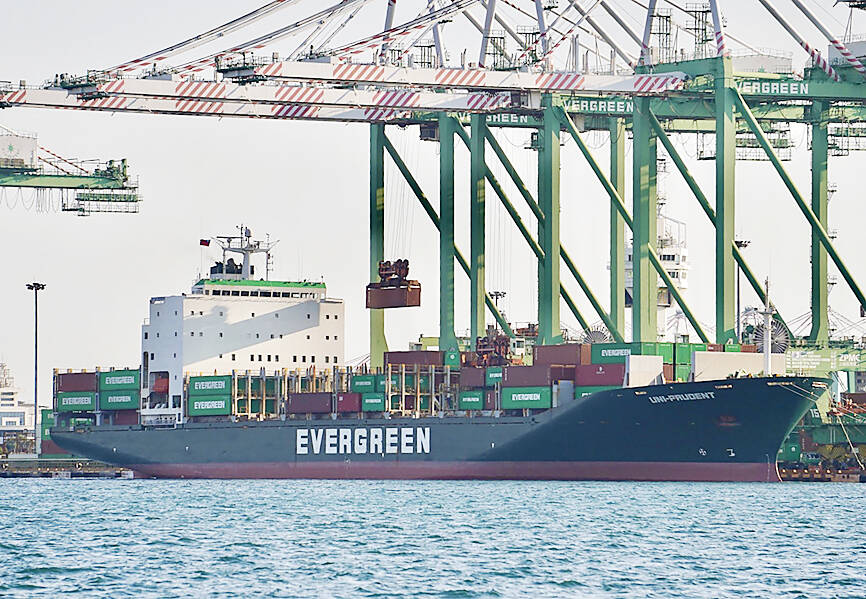A majority of CEOs expect the global economy to soften this year, while only a few are upbeat about revenue prospects, a survey released on Wednesday by PricewaterhouseCoopers (PwC) Taiwan said.
Seventy-seven percent of CEOs polled expect at a slowdown in global GDP growth, the worst sentiment since the survey began in 2012.
In last year’s survey, 79 percent of CEOs had expressed optimism.

Photo: CNA
Only 37 percent expressed confidence about revenue growth in the latest survey, a steep decline from 52 percent last year.
The consultancy collected the responses through online surveys, and telephone and face-to-face interviews from October to December last year.
The survey seeks to understand how local CEOs execute their strategic priorities against a constantly changing macro-environment, the PwC Taiwan Web site says.
Economic volatility, geopolitical conflict and inflation constitute the biggest threats this year, replacing the COVID-19 pandemic and wild currency swings, it said.
Taiwanese CEOs tend to control economic risks by diversifying products, finding alternative suppliers and reducing costs, it said.
When considering moves to mitigate exposure against geopolitical conflict, Taiwanese CEOs tend to adjust current markets and expand into new markets, whereas global CEOs tend to focus on cyberinvestments, it added.
TECHNOLOGY DISRUPTORS
While Taiwanese CEOs see supply chain disruptions and labor shortages as major challenges to their profitability, their global peers have expressed more concern over technology disruptors, and changing customer demand and preferences, PwC Taiwan said.
More than 60 percent of CEOs in Taiwan do not think their companies would be economically viable six years from now without transformation, it said.
Automation and skill enhancement-related investments rank high in terms of business management priority for local and global CEOs, it said.
In addition, global and local CEOs see climate change affecting their cost profiles and supply chains, PwC Taiwan said.
To address climate change, 22 percent of local CEOs closely cooperate with private enterprises, and most partner with non-business entities in sustainable development, it said.
China remains the most important market at 66 percent, followed by the US, Japan and Germany, it said, adding that Vietnam dropped in ranking to fifth spot with an 8 percentage point decline.
The consultancy urged companies to embrace change, calling it a reality all enterprises must face.
Strategies that can be adopted include digitalizing processes and upskilling their staff in priority areas, it said.

PATENTS: MediaTek Inc said it would not comment on ongoing legal cases, but does not expect the legal action by Huawei to affect its business operations Smartphone integrated chips designer MediaTek Inc (聯發科) on Friday said that a lawsuit filed by Chinese smartphone brand Huawei Technologies Co (華為) over alleged patent infringements would have little impact on its operations. In an announcement posted on the Taiwan Stock Exchange, MediaTek said that it would not comment on an ongoing legal case. However, the company said that Huawei’s legal action would have little impact on its operations. MediaTek’s statement came after China-based PRIP Research said on Thursday that Huawei filed a lawsuit with a Chinese district court claiming that MediaTek infringed on its patents. The infringement mentioned in the lawsuit likely involved

Taipei is today suspending work, classes and its US$2.4 trillion stock market as Typhoon Gaemi approaches Taiwan with strong winds and heavy rain. The nation is not conducting securities, currency or fixed income trading, statements from its stock and currency exchanges said. Authorities had yesterday issued a warning that the storm could affect people on land and canceled some ship crossings and domestic flights. Taiwan Semiconductor Manufacturing Co (TSMC, 台積電) expects its local chipmaking fabs to maintain normal production, the company said in an e-mailed statement. The main chipmaker for Apple Inc and Nvidia Corp said it has activated routine typhoon alert

GROWTH: TSMC increased its projected revenue growth for this year to more than 25 percent, citing stronger-than-expected demand for AI devices and smartphones The Taiwan Institute of Economic Research (TIER, 台灣經濟研究院) yesterday raised its forecast for Taiwan’s GDP growth this year from 3.29 percent to 3.85 percent, as exports and private investment recovered faster than it predicted three months ago. The Taipei-based think tank also expects that Taiwan would see a 8.19 percent increase in exports this year, better than the 7.55 percent it projected in April, as US technology giants spent more money on artificial intelligence (AI) infrastructure and development. “There will be more AI servers going forward, but it remains to be seen if the momentum would extend to personal computers, smartphones and

Catastrophic computer outages caused by a software update from one company have once again exposed the dangers of global technological dependence on a handful of players, experts said on Friday. A flawed update sent out by the little-known security firm CrowdStrike Holdings Inc brought airlines, TV stations and myriad other aspects of daily life to a standstill. The outages affected companies or individuals that use CrowdStrike on the Microsoft Inc’s Windows platform. When they applied the update, the incompatible software crashed computers into a frozen state known as the “blue screen of death.” “Today CrowdStrike has become a household name, but not in